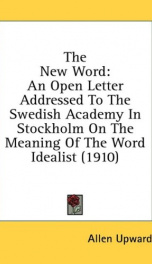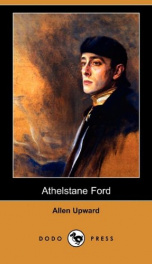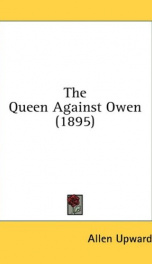Upward Allen

Allen Upward (1863 - 1926) was a poet, lawyer, politician and teacher. His work was included in the first anthology of Imagist poetry, Des Imagistes, which was edited by Ezra Pound and published in 1914. Upward was brought up as a member of the Plymouth Brethren and trained as a lawyer at the Royal University of Dublin (now University College Dublin). While living in Dublin, he wrote a pamphlet in favour of Irish Home Rule. Upward later worked for the British Foreign Office in Kenya as a judge. Back in Britain, he defended Havelock Wilson and other labour leaders and ran for election as a Lib/Lab candidate in the 1890s. He wrote two books of poetry, Songs of Ziklag (1888) and Scented Leaves from a Chinese Jar. He also published a translation Sayings of Confucious and a volume of autobiography, Some Personalities (1921). Upward wrote a number of now-forgotten novels: The Prince of Balkistan (1895), A Crown of Straw (1896), A Bride's Madness (1897), and The Accused Princess (1900) (source: Duncan, p. xii). His 1913 book The Divine Mystery is an anthropological study of Christian mythology. In 1908, Upward self-published a book (originally written in 1901) which he apparently thought would be Nobel Prize material: The New Word. This book is today known as the first citation of the word "Scientology", although it is used in the book in a disparaging way to describe "science elevated to unquestioning doctrine". It is unknown whether L. Ron Hubbard, the founder of the Scientology-organization, knew of this book. In 1917 the British Museum refused to take Upwards' manuscripts, "on the grounds that the writer was still alive," and Upward burned them (source: Duncan, p. xi). He shot himself in November 1926, reportedly after hearing of George Bernard Shaw's Nobel Prize award.
do you like this author?
What readers are saying
What do you think? Write your own comment on this book!
write a commentWhat readers are saying
What do you think? Write your own comment on this author!
write a commentBook list

The International SpyBeing the Secret History of the Russo-Japanese War
Series:
Unknown
Year:
Unknown
Raiting:
4/5
Show more
add to favoritesadd In favorites

the new word an open letter addressed to the swedish academy in stockholm on t
Series:
Unknown
Year:
Unknown
Raiting:
4.5/5
Show more
add to favoritesadd In favorites
Book list

The International SpyBeing the Secret History of the Russo-Japanese War
Series:
Unknown
Year:
Unknown
Raiting:
4/5
Show more
add to favoritesadd In favorites

the new word an open letter addressed to the swedish academy in stockholm on t
Series:
Unknown
Year:
Unknown
Raiting:
4.5/5
Show more
add to favoritesadd In favorites

the new word
Series:
Unknown
Year:
Unknown
Raiting:
4/5
Originally published in 1910. This volume from the Cornell University Library's print collections was scanned on an APT BookScan and converted to JPG 2000 format by Kirtas Technologies. All titles scanned cover to cover and pages may include marks notations and other marginalia present in the original volume.
Show more
add to favoritesadd In favorites

the divine mystery a reading of the history of christianity down to the time o
Series:
Unknown
Year:
Unknown
Raiting:
3/5
Show more
add to favoritesadd In favorites

secret history of to day being revelations of a diplomatic spy
Series:
Unknown
Year:
Unknown
Raiting:
3.5/5
Show more
add to favoritesadd In favorites

Athelstane Ford
Series:
Unknown
Year:
Unknown
Raiting:
3.5/5
Allen Upward (1863-1926) was a poet, lawyer, politician and teacher. His work was included in the first anthology of Imagist poetry, Des Imagistes, which was edited by Ezra Pound and published in 1914. He was brought up as a member of the Plymouth Brethren and trained as a lawyer at the Royal University of Dublin. While living in Dublin, he wrote a pamphlet in favour of Irish Home Rule. Upward later worked for the British Foreign Office in Kenya as a judge. He wrote two books of poetry: Songs of Ziklag (1888) and Scented Leaves from a Chinese Jar (1913). He also published a translation Sayings of Confucious (1904) and a volume of autobiography, Some Personalities (1921). Upward wrote a number of now-forgotten novels: The Prince of Balkistan (1895), A Crown of Straw (1896), A Bride's Madness (1897), and The Accused Princess (1900). In 1908, Upward self-published a book which he apparently thought would be Nobel Prize material: The New Word. This book is today known as the first citation of the word "Scientology".
Show more
add to favoritesadd In favorites
What readers are saying
What do you think? Write your own comment on this author!
write a commentif you like Upward Allen try:
readers also enjoyed
What readers are saying
What do you think? Write your own comment on this author!
write a commentGenre
if you like Upward Allen try:
readers also enjoyed
Do you want to read a book that interests you? It’s EASY!
Create an account and send a request for reading to other users on the Webpage of the book!


